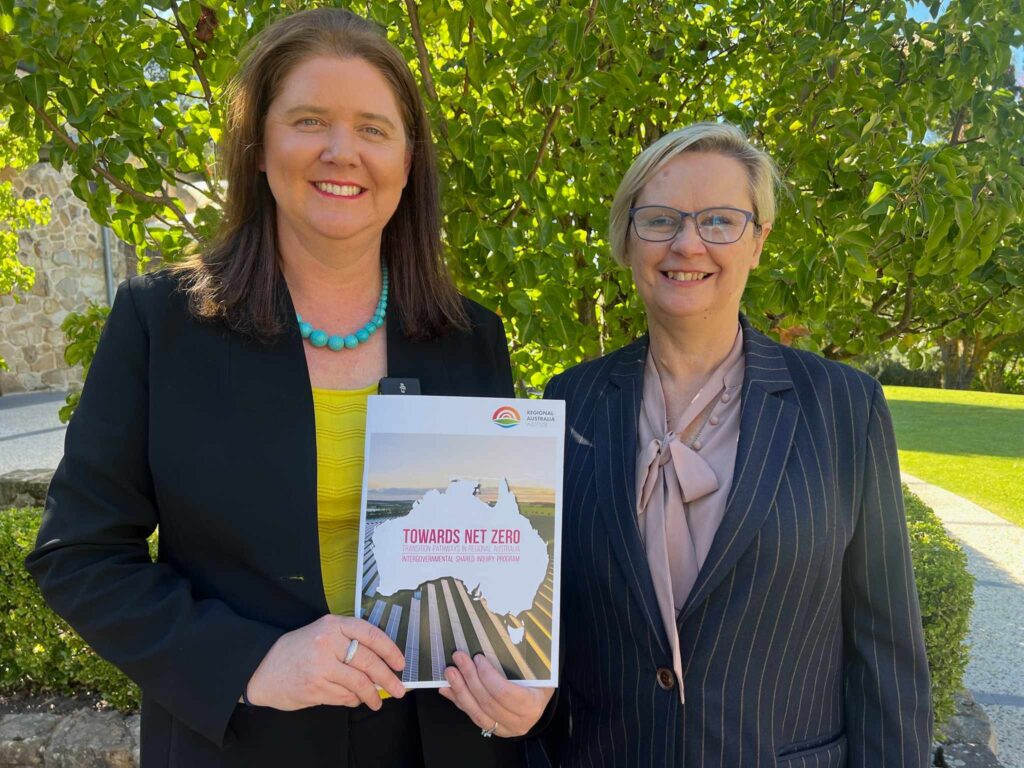We represented our region at Regions Rising South Australia in the Adelaide Hills recently. The event brought together leaders and experts to talk about the future of South Australia's regional areas. Hosted by the Regional Australia Institute (RAI), the day was packed with discussions, covering everything from jobs and training to renewable energy and community wellbeing. Here's a quick overview.
Starting with the morning's proceedings, the event began with Cassandra Hough, who, as the MC, set the tone for a day of meaningful discussions. Known for her role as an ABC journalist and host of the SA Country Hour, her expertise in addressing rural and regional issues was invaluable in guiding the day's conversations.
Following Cassandra, a Welcome to Country was gracefully delivered by Ivan Tiwu Copley OAM, a respected Kaurna Elder. His words reminded everyone of the deep, enduring connections to the land and the importance of acknowledging and respecting the traditional custodians and their cultures.
Lucy Huxter, an elected member of the Adelaide Hills Council, spoke next, providing a local government's perspective on the unique opportunities and challenges within the Adelaide Hills region. Her insights set the stage for the discussions to follow, grounding them in the local context and community interests.

The first keynote address was delivered by The Hon. Clare Scriven MLC, Minister for Primary Industries and Regional Development, who emphasised, “Community wellbeing has got to be part of this place-based development approach to our regions,” highlighting the government’s commitment to not just economic growth but enhancing the quality of life in regional communities. She discussed the importance of training and development in the regional workforce and the necessity of creating opportunities for small to medium enterprises (SMEs) to thrive, which are crucial for the economic and social fabric of regional areas.
Following her, Liz Ritchie, CEO of the Regional Australia Institute, presented compelling data on the growing trend of Australians choosing regional living over urban centres. Ritchie pointed out that regional migration is 13.8% higher than pre-pandemic levels, indicating a significant shift in where Australians choose to live and work. However, she cautioned, “If we get this wrong, regions will see higher levels of unemployment and inevitably the livability of regional towns will lessen.” Ritchie called for targeted support for these regions, emphasising the need for data and analytics tailored to local communities to help them transition towards sustainable growth and net zero targets.
The event then moved into a series of panel discussions that delved deeper into specific issues.
Panel on Net Zero – Preparing South Australia for the Transition
This panel, facilitated by Cassandra Hough, focused on the transition to net zero and its implications for South Australia. Key participants included The Hon. David Speirs MP, Richard Day from the Office of Hydrogen Power SA, Caroline Rhodes from Primary Producers SA, Dave McKeon from Thomas Elder Sustainable Agriculture, Elders, and Jeremy Maslin from Katanning Energy.
Richard Day highlighted South Australia's leadership in renewable energy, stating, “We are first in the world as a percentage share of wind and solar.” However, Caroline Rhodes raised concerns about the potential impacts on agriculture. She noted, “In SA we have less than 4% available land...if done poorly could come at the expense of agriculture.” Her comments underscored the challenges of land use conflicts between renewable energy projects and agricultural production, highlighting the need for careful planning and stakeholder engagement.
Panel on The Workforce Challenge – Filling the Jobs of the Future
Led by Kelly-Anne Saffin, CEO of Regional Development Australia SA, this panel addressed the challenges and strategies around developing a skilled workforce for the future. Discussions centered on the importance of vocational training, skilled migration, and creating an attractive proposition for retaining talent in regional areas. This session brought to light the necessity of aligning education and training opportunities with the emerging needs of the regional job market, ensuring that local communities have the skills and support needed to thrive in a changing economic landscape.
Insights on Connectivity and Regional Housing
Stephen Smith, General Manager of Sustainability at NBN Co., shared insights on the critical role of connectivity in regional development. Smith's discussion on expanding the NBN network to improve internet access underscored the importance of digital infrastructure in supporting economic growth, access to services, and the transition to net zero.
The Regional Housing Summit overview, presented by Laureta Wallace from the RAI, tackled the pressing issue of housing in regional areas. The summit's findings highlighted the tight rental markets and unprecedented job vacancies, pointing to a need for systemic solutions to the regional housing crisis.
These panel discussions painted a comprehensive picture of the multifaceted approach needed to address the challenges facing South Australia's regions. From energy transition and land use to workforce development, connectivity, and housing, the conversations underscored the importance of integrated strategies that consider the economic, social, and environmental dimensions of regional development.
Report released: Towards Net Zero - Transition Pathways In Regional Australia
At Regions Rising, Regional Australia Institute released their Towards Net Zero report, which sets out potential pathways for communities and businesses in regional Australia by exploring Australia’s position in the global context; examining the role of Regional Cities; and highlighting the elements of success in communities that are leading the way. You can read it here.












